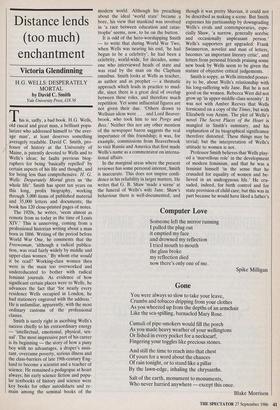Distance lends (too much) enchantment
Victoria Glendinning
H.G. WELLS: DESPERATELY MORTAL by David C. Smith Yale University Press, £18.50 This is, sadly, a bad book. H.G. Wells, old rascal and great man, a brilliant popu- larizer who addressed himself to 'the aver- age man', at least deserves something averagely readable. David C. Smith, pro- fessor of history at the University of Maine, is patently devoted to Wells and to Wells's ideas; he faults previous biog- raphers- for being 'basically repelled' by certain aspects of his life and thought, and for being less than comprehensive. H. G. Wells: Desperately Mortal gives us 'the whole life'. Smith has spent ten years on this long, prolix biography, working through 3,000 items of published material and 35,000 letters and documents; the book has 120 close-printed pages of notes.
The 1920s, he writes, 'seem almost as remote from us today as the time of Louis XIV.' This is unnerving, coming from a professional historian writing about a man born in 1866. Writing of the period before World War One, he comments that the Freewoman, 'although a radical publica- tion,. was read fairly widely by middle and upper-class women.' By whom else would it be read? Working-class women then were in the main too overworked and undereducated to bother with radical feminist journals. As evidence of how significant certain places were to Wells, he advances the fact that 'for nearly every residence Wells occupied in London, he had stationery engraved with the address.' He is unfamiliar, apparently, with the most ordinary customs of the professional classes.
Smith is surely right in ascribing Wells's success chiefly to his extraordinary energy — 'intellectual, emotional, physical, sex- ual'. The most impressive part of his career is its beginning — the story of how a puny boy with no advantages, a draper's assis- tant, overcame poverty, serious illness and the class-barriers of late 19th-century Eng- land to become a scientist and a teacher of science. He remained a pedagogue at heart always; his early science fiction and popu- lar textbooks of history and science were key books for other autodidacts and re- main among the seminal books of the modern world. Although his preaching about the ideal 'world state' became a bore, his view that mankind was involved in 'a race between education and catas- trophe' seems, now, to be on the button.
It is odd of the hero-worshipping Smith — to write that during World War Two, when Wells was nearing his end, 'he had begun to be a celebrity'; he had been a celebrity, world-wide, for decades, some- one who interviewed heads of state and was read by the man on the Clapham omnibus. Smith looks at Wells as teacher, as author and as prophet — a thematic approach which leads in practice to mud- dle, since there is a great deal of overlap between these roles, and therefore much repetition. Yet some influential figures are not given their due. 'Others drawn to Wellsian ideas were . . . and Lord Beaver- brook, who took him to see Porgy and Bess.' Neither this nor any other mention of the newspaper baron suggests the real importance of this friendship; it was, for example, commissions from Beaverbrook to visit Russia and America that first made Wells's name as a commentator on interna- tional affairs.
In the marginal areas where the present reviewer has some personal interest, Smith is inaccurate. This does not inspire confi- dence in his reliability in larger matters. He writes that G. B. Shaw 'made a scene' at the funeral of Wells's wife Jane. Shaw's behaviour there is well-documented, and though it was pretty Shavian, it could not be described as making a scene. But Smith expresses his partisanship by downgrading Wells's rivals and contemporaries, espe- cially Shaw, 'a narrow, generally acerbic and occasionally unpleasant person.' Wells's supporters get upgraded: Frank Swinnerton, novelist and man of letters, becomes 'an important literary critic', and letters from personal friends praising some new book by Wells seem to be given the stature of objective critical judgements.
Smith is soppy, as Wells intended poster- ity to be, about Wells's relationship with his long-suffering wife Jane. But he is not good on the women. Rebecca West did not grow up 'in upper-middle-class serenity'. It was not with Amber Reeves that Wells fornicated on a copy of the Times, but with Elizabeth von Arnim. The plot of Wells's novel The Secret Places of the Heart is mangled in Smith's summary, and his explanation of its biographical significance therefore distorted. These things may be trivial; but the interpretation of Wells's attitude to women is not.
Professor Smith believes that Wells play- ed a 'marvellous role' in the development of modern feminism, and that he was a feminist himself 'in the sense that he crusaded for equality of women and be- lieved in an androgynous life.' He cru- saded, indeed, for birth control and for state provision of child care; but this was in part because he would have liked a father's role to be less demanding in time and money than society decreed. If he wanted women to be 'free', it was chiefly so that they might be sexually available outside marriage.
He mocked militant suffragists mer- cilessly in his fiction; he divided woman- kind into wife-types and mistress-types, and pitied the `independent' woman; he remarked to Arnold Bennett (in a letter not quoted here) on the essential `secon- dariness' of women. What Professor Smith calls his `profound longings' for the perfect love boiled down to what Smith repeatedly refers to as `sexual release'. H. G. Wells, in his optimism and didacticism, as in his attitudes to sex, was not so much the Shape of Things to Come in his own person as the last of the great Victorians.



























































 Previous page
Previous page